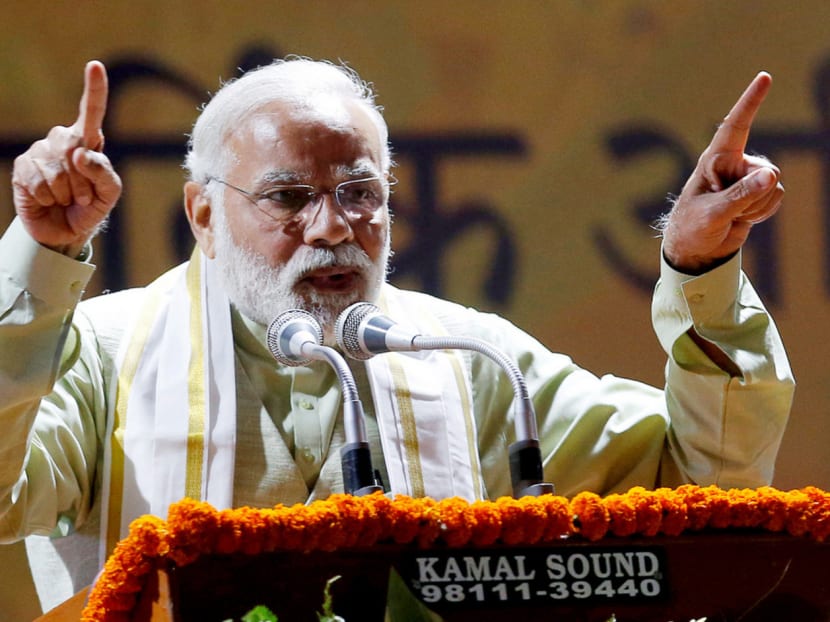In power play with China, India to pledge billions to Bangladesh
NEW DELHI — India is likely to give Bangladesh a credit line of at least US$3.5 billion (S$4.9 billion) for infrastructure projects during Prime Minister Sheikh Hasina’s state visit next month, as Beijing and New Delhi jostle for geopolitical influence in South Asia.

Prime Minister Narendra Modi’s government will extend a S$4.9 billion line of credit — its third — to Bangladesh to integrate the region’s trade infrastructure. Photo: REUTERS
NEW DELHI — India is likely to give Bangladesh a credit line of at least US$3.5 billion (S$4.9 billion) for infrastructure projects during Prime Minister Sheikh Hasina’s state visit next month, as Beijing and New Delhi jostle for geopolitical influence in South Asia.
The credit line, which would be India’s third to its neighbour, would go towards a variety of projects ranging from nuclear and liquefied natural gas power plants to ports, railways and the establishment of special economic zones, according to a Bangladesh government document seen by Bloomberg.
New Delhi and Dhaka will also sign a defence cooperation agreement and various memorandums of understanding (MOUs) relating to hydro projects in Bhutan, shipbuilding and upgrading border posts, according to a separate document.
India is trying to strengthen relationships with neighbouring states such as Bangladesh and Sri Lanka as China continues to court South Asian nations by pledging large sums of money for port and infrastructure projects that New Delhi views with suspicion.
In a sign of its deepening ties with Beijing, Bangladesh bought two submarines from China last year.
The government of Indian Prime Minister Narendra Modi, who announced a second US$2 billion line of credit when he visited Bangladesh in 2015 after an earlier US$800 million credit line, has tried to integrate the region’s economies with road, rail and shipping routes.
But as India seeks to unite its neighbours against its arch-rival Pakistan, New Delhi’s financial firepower still pales in comparison to the funds available to Chinese President Xi Jinping, who last year pledged US$20 billion in low-cost loans for infrastructure projects, in addition to existing large investments in Pakistan and Sri Lanka.
“Ideally, they would like to counter that, but the Chinese offer is such a huge amount, they can’t possibly match that,” said Mr Harsh Pant, an international relations professor at King’s College London.
Ms Hasina’s visit, starting on April 7, is her first in seven years, according to India’s Foreign Ministry, and comes against the backdrop of a fresh surge in Islamic State-linked attacks across the country.
Bangladesh’s growth is expected to increase to 7.2 per cent this fiscal year from 7.1 per cent last fiscal year according to government estimates.
“India will give Bangladesh as much as US$5 billion, which is a new development,” Dr Mashiur Rahman, economic affairs adviser to Ms Hasina, said by phone.
“There are many areas to look at, but economic cooperation is the most substantive.
‘‘Joint investments and joint entrepreneurship will open up the new directions of cooperation.”
India’s Oil Minister Dharmendra Pradhan said he expects some agreements to be signed after the meeting between the two leaders.
“We are discussing several energy projects with Bangladesh such as LNG and supply of petroleum products.”
The credit line would include US$940 million for the development of a component of the Rooppur nuclear power plant, US$350 million for a multipurpose terminal at Bangladesh’s Payra port and US$177 million for a power transmission line between India’s Jharkhand and Bangladesh’s Bogra.
The two countries would agree to upgrade some customs posts, as well as establish border markets for vendors, along their 4,096km boundary, and will sign MOUs relating to shipping routes and the operation of satellites, according to the documents. BLOOMBERG





